121 Express by Monique Polak
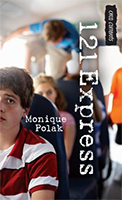 Summary: Lucas is determined to change his nerdy reputation when he switches schools. Going from brainiac to popular proves to be pretty easy though if he’s willing to make a few bold moves on the 121 Express bus. His efforts quickly pay off, but the pranks on the bus become more and more outrageous – opening the emergency window, dumping yogurt on another car’s windshield, throwing objects at pedestrians – until the bus driver himself has a nervous breakdown. When one of Lucas’ other friends is about to be the victim of the next prank, it is up to him to stand up for what’s right.
Summary: Lucas is determined to change his nerdy reputation when he switches schools. Going from brainiac to popular proves to be pretty easy though if he’s willing to make a few bold moves on the 121 Express bus. His efforts quickly pay off, but the pranks on the bus become more and more outrageous – opening the emergency window, dumping yogurt on another car’s windshield, throwing objects at pedestrians – until the bus driver himself has a nervous breakdown. When one of Lucas’ other friends is about to be the victim of the next prank, it is up to him to stand up for what’s right.
Number of Pages: 106
Age Range: 13-15
Review: An intense, brief read, 121 Express by Monique Polak follows one teen’s ascendency to popularity on the daily express bus in Ville St. Laurent, Quebec. This is one of those books that tells a story you can’t look away from, even though you are sure it’s going to end in disaster. 121 Express will easily hook reluctant readers as the hijinks of the students grow in intensity until a student’s life is in danger.
The pranks with Sandeep turned my stomach. I was on pins and needles wondering if Lucas was going to step up and prevent the horrible thing they were planning to do to him. It was quite the nail-biting read in that respect.
While I enjoyed this exploration of peer dynamics, I was a bit confused by the ending though with the letter from The Hot Dog Haven. Not sure if it was meant to set up a sequel or to let the reader know the students had not changed much after all, but merely moved their bad behaviour somewhere else. It’s not a neat or moral based ending, but perhaps it is more truthful instead.
Memorable Quotes:
“As the bus turned onto Côte-Vertu Boulevard, I remembered our science teacher said we’d be studying Charles Darwin’s theory of natural selection this year. She told us how Darwin believed only the fittest creatures survive.
Darwin was onto something. A kid’s got to be fit to survive the 121 Express.” – Lucas from 121 Express by Monique Polak, pages 7-8
121 Express by Monique Polak is published by Orca Currents (2008).
(Buy this book: Amazon | Indigo
| Canadian Booksellers)
Esther by Sharon E. McKay
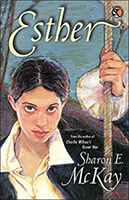 Summary: Esther is a Jewish girl living in the 1700s, a time when both Jewish people and women are controlled and undervalued. An outsider in her own community due to the nature of her birth, Esther uses a shipwreck to escape her family after learning her father is going to marry her off to Red, the rag picker. She is rescued by Philippe, a sailor, who helps her get on her feet by finding her a place to stay and work. When things go wrong though, Esther transforms herself into a boy and runs away. Thus begins a series of adventures that lead her to New France, where she must confront the choice she is offered to convert to Catholicism and stay in Quebec or be sent back to France as a prisoner.
Summary: Esther is a Jewish girl living in the 1700s, a time when both Jewish people and women are controlled and undervalued. An outsider in her own community due to the nature of her birth, Esther uses a shipwreck to escape her family after learning her father is going to marry her off to Red, the rag picker. She is rescued by Philippe, a sailor, who helps her get on her feet by finding her a place to stay and work. When things go wrong though, Esther transforms herself into a boy and runs away. Thus begins a series of adventures that lead her to New France, where she must confront the choice she is offered to convert to Catholicism and stay in Quebec or be sent back to France as a prisoner.
Number of Pages: 314
Age Range: 15-17
Review: From the beginning, Esther has been like a caged bird in her conservative Jewish family. Paying for the sins of her father, she is promised to the local rag picker after she comes home unsupervised one night and causes a scandal in their close community.
This one event starts a sequence of events that help guide Esther to the life she is meant to live, if she is brave enough to do so. Good thing bravery, integrity, and sheer grit are characteristics Esther possesses in spades, along with the ability to think outside the box.
I like what Sharon McKay is doing here. She took the bare bones of the story of the first Jewish person in New France, and created this amazing character who faces incredible situation after incredible situation with heart and determination. It reminded me a little of The True Confessions of Charlotte Doyle by Avi.
What I enjoyed the most was that even though Esther leaves her family and her childhood home, she takes with her the traditions, beliefs and lifestyle that make her who she is. I loved the last quote I have from her in my Memorable Quotes section, because it shows her continuing strength of character. Near the beginning of the novel she tries to tell her father that she wants wings instead of roots, but when she gets her wings it is her roots that ground her as needed. They serve as a perch that she is able to launch herself from and rest on again and again.
Esther is an adventurous read for mid female teens, but definitely for a more committed reader.
Memorable Quotes:
“‘It is your faith that gives you roots, my daughter,’ Papa shouted from below.
‘It’s not roots I want, Papa,’ Esther whispered. ‘It’s wings.'” – conversation between Esther and her father from Esther by Sharon E. McKay, page 66
“Once caged, nothing lived long.” – from Esther by Sharon E. McKay, page 155
“Esther snatched the keys off the table and bent down to unlock the strong box, all the while trying to stop the flow between her legs. Her hands shook. After everything, after all her efforts … It was a betrayal, her own body was betraying her in a way she had never imagined.” – Esther from Esther by Sharon E. McKay, page 185
“‘I have learned that I can live without love and food and even shelter, but I cannot live without hope. In my father’s house there was only certainty. This I knew in that instant when my hand was poised to rap at my father’s door. I knew then that I could never, willingly, return.'” – Esther from Esther by Sharon E. McKay, page 203
“What did it matter what faith she practised? Was there not one God? Was the God of Moses not the God of Jesus? Were not the Jews, Christians and Muslims all the children of Abraham?” – from Esther by Sharon E. McKay, page 302
“‘Monseigneur, I have learned that fate and choice are mocked by chance. I pray in my heart that God controls that which is out of our control. And when the next world comes I shall say that I have lived my life as best I could, and I give to the Creator all that I have learned, and that I remain forever in my heart, if not always in deed, a Jew.'” – Esther from Esther by Sharon E. McKay, page 305
“It will not be long before I stand awaiting judgment before the Lord my God. Would that I had learned from Esther Brandeau that life is an endless list of possibilities. Would that I had known what this girl knew all along, that no matter how many times circumstances might change our direction, God’s greatest gift is the freedom to choose.” – Guy de Bougainville from Esther by Sharon E. McKay, page 312
Esther by Sharon E. McKay is published by Penguin Canada (2004).
(Buy this book: Indigo | Canadian Booksellers)
Miracleville by Monique Polak
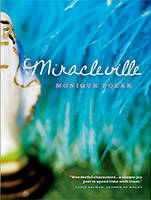 Summary: Ani and her sister Colette live in Ste-Anne-Beaupré, Quebec, a religious town named after one of Quebec’s patron saints. People come from far and wide to petition Saint Anne for miracles, and Ani’s family runs a store that sells religious souvenirs to those who are on pilgrimages. When an accident happens at the store leaving Ani and Colette’s mother paralyzed from the waist down, Ani reconsiders her views on God, miracles, and the church all while dealing with the complicated feelings of being a sixteen year-old.
Summary: Ani and her sister Colette live in Ste-Anne-Beaupré, Quebec, a religious town named after one of Quebec’s patron saints. People come from far and wide to petition Saint Anne for miracles, and Ani’s family runs a store that sells religious souvenirs to those who are on pilgrimages. When an accident happens at the store leaving Ani and Colette’s mother paralyzed from the waist down, Ani reconsiders her views on God, miracles, and the church all while dealing with the complicated feelings of being a sixteen year-old.
Number of Pages: 246
Age Range: 14-16
Review: Miracleville by Monique Polak explores the challenging nature of being comfortable in your own skin, no matter what your circumstances.
Polak creates characters who each have something they need to learn to live with. In Marco’s case, it’s about embracing the fact that he is gay in spite of the Catholic church’s stance on the matter, and learning to live as a paraplegic after one drunken night in the train yard. For Colette, ADHD constantly affects her decisions and behaviours, sometimes in a negative way, but also makes her energetic and hopeful. Ani herself has to become comfortable with her introspective nature and a secret truth that is revealed to her when a new priest comes to town. These are just a few examples, but the book itself is carefully orchestrated to provide multiple examples of living with challenging situations.
I have two favourite parts in Miracleville. The first is the relationship between Ani and Colette. They drive each other crazy and tease each other as sisters do, but they are also kind of like each other’s missing halves. They complete each other, and they know it.
My second favourite part is at the end of the novel when everything Ani has been pondering comes together and she makes a powerful statement about the role of miracles. It touched me, and of course I have included it in my Memorable Quotes section.
Dealing with themes of religion, faith, miracles, and family, Miracleville is a thoughtful book for mid teen readers who are looking for a deeper read.
Memorable Quotes:
“Each of those poor souls has come to Ste-Anne-de-Beaupré to pray for a miracle. Sometimes, when I’m walking on Avenue Royale, I feel hope hanging in the air like a living thing.” – Ani from Miracleville by Monique Polak, page 3
“We’ve come to a stop sign and now Father Francoeur is looking at his hands. ‘Faith,’ he said slowly, ‘is believing God knows best. Even if we don’t always understand His ways.’
Father Francoeur must know that’s not the answer I wanted. ‘I want a guarantee…,’ I say, hesitating a little before I go on, ‘that everything’s going to be all right.’
‘That’s just it,’ Father Francoeur says, smiling. ‘Everything is going to be all right. No matter what happens.'” – conversation between Father Francoeur and Ani from Miracleville by Monique Polak, page 79
“When I slap Colette, it feels like my hand is moving without me. As if it slipped out from under my sleeve to smack her cheek. As if the red mark on her cheek appeared out of nowhere and had nothing to do with me.
It’s not fair that I’m the one who ends up crying. Colette’s been irresponsible, not me. I’m just trying to protect her. Only I can’t protect her anymore. That’s the problem.” – Ani from Miracleville by Monique Polak, page 137
“‘I don’t even like to think about sex. I mean… I do think about it, quite a lot sometimes, but I try not to.’ The words have slipped out of me, and immediately I’m sorry I said them . . .
But Tante Hélène only pats my hair and sighs. ‘One day, when you care from somebody, and when your body’s ready, you won’t mind thinking about it,” she says. ‘You probably won’t be able to stop thinking about it! And one day, when you’re an old woman like me, you’ll be able to explain things to a young woman like you. And that way, we make things a little better. For all of us.'” – conversation between Ani and Tante Hélène from Miracleville by Monique Polak, pages 142-143
“‘I was running away from me.’ Marco pauses I know he’s remembering again. ‘From knowing I was gay. From thinking it was a sin. But you can’t run away from who you are. Even if your legs work right.'” – Marco from Miracleville by Monique Polak, page 161
“I guess I always thought that as I got older, I’d understand things better. That I’d be able to describe about miracles and religion and the kind of person I want to be – a believer like Mom, a skeptic like Dad or something in between. But the older I get, the more confused I feel.” – Ani from Miracleville by Monique Polak, page 181
“When our eyes meet, she nods. There’s nothing disgusting about her. Nothing at all. I’m the monster, not her. All along, I’ve had it wrong. The really monstrous don’t show on our outsides.” – Ani from Miracleville by Monique Polak, page 191
“And that, I decided, is because somewhere in all of us, there is faith. Faith that life makes sense. Faith that even though terrible things happen, there is still goodness and hope.” – Ani from Miracleville by Monique Polak, page 222
“Hope’s a funny thing. A little hope can go a long way, and yet, there’s something painful about hope too. If what we’re hoping for doesn’t happen, we might end up feeling even worse than we already did when the accident first happened. And yet the hope that Mom might regain some movement in her lower body had lightened the atmosphere in our house, just like Marco said. Hope is making us kinder with each other and more patient.” – Ani from Miracleville by Monique Polak, page 244
“And that’s when I realize that maybe it’s true that the real miracle isn’t when someone throws away their crutches or stops being paralyzed. Maybe the real miracle is way simpler than that. Maybe the miracle is not giving up. Maybe it’s staying hopeful even when you’re not sure how things will turn out.” – Ani from Miracleville by Monique Polak, page 244
Miracleville by Monique Polak is published by Orca Book Publishers (2011).
(Buy this book: Amazon | Indigo
| Canadian Booksellers)
Wild Geese by Caroline Pignat
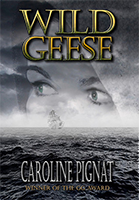 Summary: Driven by the desire to reunite with her family as well as running from the law in Ireland, Kit disguises herself as Mick’s younger brother and books passage with him to Canada. A break out of Typhus on a lengthy ship voyage causes them to be quarrantined at Grosse Ilse in Quebec, but Kit doesn’t let that stop her in her pursuit of her siblings. When she finds them, however, her goal of being a family again runs into some significant barriers and Kit finds she must re-evaluate what is best for everyone. A period of self discovery with the nuns in Bytown, Quebec helps her clarify what she wants from life, and when the opportunity comes to follow a new dream, she grasps it with both hands.
Summary: Driven by the desire to reunite with her family as well as running from the law in Ireland, Kit disguises herself as Mick’s younger brother and books passage with him to Canada. A break out of Typhus on a lengthy ship voyage causes them to be quarrantined at Grosse Ilse in Quebec, but Kit doesn’t let that stop her in her pursuit of her siblings. When she finds them, however, her goal of being a family again runs into some significant barriers and Kit finds she must re-evaluate what is best for everyone. A period of self discovery with the nuns in Bytown, Quebec helps her clarify what she wants from life, and when the opportunity comes to follow a new dream, she grasps it with both hands.
Number of Pages: 313
Age Range: 14-16
Review: In case you can’t tell by the amount of quotes I have included, I loved this book. And the best part is that it’s a sequel. I haven’t read Greener Grass by Caroline Pignat, the book that comes before Wild Geese, but there weren’t any significant plot holes due to it being the second book in a series. Although based on what was said about it in Wild Geese, my interest is definitely piqued. I chose Wild Geese because it is set in Quebec and therefore fits in nicely with my Marathon of Books.
Kit is an irrepressible character with a big heart and a single-minded determination to reunite her family and make everything okay again after all of the hardship they endured in Ireland. But when things don’t go as planned, Kit has to face herself and her past and determine the best way forward. There is no doubt that even though she has encountered adversity after adversity that she will continue on. I loved how every time it looked like Kit was going to give up (which wasn’t often), Pignat provided her with encouragement through other characters and their stories and sometimes through Kit’s own thought processes.
Wild Geese is a book chalk full of beloved characters, from Murph and his grandchildren, to Billy, to Jack, to Mick, to Mother Bruyere. They all had something to contribute to the tale, and I learned powerful life lessons from all of them.
I loved the metaphor of Kit being one of the wild geese, based on the story of Irish men fighting for England in foreign wars. Pignat skillfully ties in the act of Kit’s ongoing survival to the story, proving she has just as much mettle as they did in their situation.
I also loved the nuns. They were a truly positive force in the book without being pushy or overly religious, acting always out of love for anyone they came across. Also, I loved the scene between Mother Bruyere and Kit where Kit is asked if she still believes in God after everything that has happened and she says a hesitant yes. Mother Bruyere responds in a sensitive manner by saying that great faith lives with great doubt.
I’m using the word love a lot, but it was just a great book. With engaging characters, a well-paced plot and a satisfying ending, this is one of those books that makes me want to go and read every other book the author has ever written, because I just can’t believe I’ve lived without reading her work before. Read the quotes and you will understand what I am talking about. Thankfully there are more Caroline Pignat books on my Marathon of Books list.
Memorable Quotes:
“I know all too well. Famine, disease, loss. Sadly, my story is no different than the hundred others stacked on these berth shelves. I’ve heard so many these past two weeks. Homes destroyed. Families torn apart. Around the cook fires and in shadowy berths, we talk about our villages, our loved ones, the way it was. We sympathize. But it doesn’t change anything. Our stories are what they are. And after a while, we stop telling them.” – Kit from Wild Geese by Caroline Pignat, page 12
“At least he has food. Our food. I pray he isn’t taking much. Fergal may be able to work miracles, but even the Lord Jesus Christ himself needed two fish and five loaves to get started.” – Kit from Wild Geese by Caroline Pignat, page 62
“I don’t aruge with him. Sure, isn’t he himself doing the very same thing? Bishop’s orders or not, I’d be on the first steamer out of here if it was me. Miles away, just like many of the workers eager to be off this death island. ‘Tis supposed to be an entry into Canada, not an exit to the afterlife.” – Kit from Wild Geese by Caroline Pignat, page 135
“I nod, not bothering to tell her I’m a girl. The other robed women are doing the same for other immigrants, combing and cutting hair, washing bodies, shaving the men. Such simple things, really, but it amazes me how wonderful it feels. To be clean. To be cared for.” – Kit from Wild Geese by Caroline Pignat, page 172
“‘Limits are manmade things, Kit. Things other people invent to hold us back. ‘Tis up to us to bide them or not.'” – Billy from Wild Geese by Caroline Pignat, page 181
“She peers at me from about the dark smudges in her pale face. Annie, but not all of her. She’s lost a bit of herself on the journey. I suppose we all have.” – Kit from Wild Geese by Caroline Pignat, page 199
“I survived that hell, I tell myself. The famine, the jail, the crossing. I found Jack. I found Annie. I will survive this.
I will.
Someday, I’ll be looking at that moon through the window of my own home with my family gathered ’round. There is a way: there has to be, even if I can’t see it yet.” – Kit from Wild Geese by Caroline Pignat, page 205
“‘Bye, Kit,’ she says, hugging me tight.
I can’t speak. Can’t breathe. My words are smothered in pain. I lived to find her, to keep her. What will I live for now?” – Annie and Kit saying good-bye from Wild Geese by Caroline Pignat, page 252
“She reaches for my hand. ‘Kit, great faith lives beside great doubt. If we had all the answers, we would not need faith.'” – Mother Bruyere from Wild Geese by Caroline Pignat, page 257
“All this time, I thought they didn’t care, but maybe, just maybe, they didn’t understand.” – Kit from Wild Geese by Caroline Pignat, page 263
“It all rushed out of me, my sins of murder, envy, hatred, theft, deceit, doubt, anger, and greed. It sickened me to bring them up and spew them out – but I had to. I just had to. For I could carry them no longer.” – Kit from Wild Geese by Caroline Pignat, page 273
“‘No matter what they take from you,’ I sit on the bed and rest my hand on Billy’s heart as Murph’s words echo through me, ‘they can’t take what’s in here. And with that, why, you’ve got all you need.'” – Kit talking to Billy from Wild Geese by Caroline Pignat, page 281
“The cold truth of it hits me, numbing the heat of my will. As much as I want him here with me, as badly as I need him to live, I love him too much to make him stay. Moving to his head, I rest my mouth on his one more time, only this time I don’t blow. I kiss.” – Kit from Wild Geese by Caroline Pignat, page 288
“He won’t say the words again. Won’t nudge them out like a young robin fresh from the nest, only to see them dashed to the ground like they were in the storeroom of the ship those long months back. They perch in him, in both of us, teetering on the edge of flight. Or failure. I feel them battering their wings inside of my heart.
Say it. Say it. Say it.” – Kit from Wild Geese by Caroline Pignat, page 311
Wild Geese by Caroline Pignat is published by Red Deer Press (2010).
(Buy this book: Amazon | Indigo
| Canadian Booksellers)
Rink of Dreams by Nancy L. M. Russell
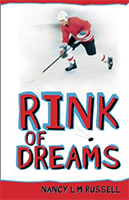 Summary: Living in Charlottetown, Prince Edward Island, a town that is dedicated to its hockey teams, Gary McDonald is a thirteen year-old hockey player hoping to make the local Bantam AAA. A farm team called the New Mexico Snow Dogs moves to Charlottetown, but the small community paired with the team’s overall lack of skill means ticket sales are not meeting the owners’ expectations. One player named Dmitri, however, is headed for stardom in the NHL, but his problems with the Russian Mafia require that he turn to Gary and his family for help. In the midst of all of the drama, Gary is also dealing with the separation of his parents and conflict with another kid on his hockey team.
Summary: Living in Charlottetown, Prince Edward Island, a town that is dedicated to its hockey teams, Gary McDonald is a thirteen year-old hockey player hoping to make the local Bantam AAA. A farm team called the New Mexico Snow Dogs moves to Charlottetown, but the small community paired with the team’s overall lack of skill means ticket sales are not meeting the owners’ expectations. One player named Dmitri, however, is headed for stardom in the NHL, but his problems with the Russian Mafia require that he turn to Gary and his family for help. In the midst of all of the drama, Gary is also dealing with the separation of his parents and conflict with another kid on his hockey team.
Number of Pages: 252
Age Range: 13-14
Review: Rink of Dreams is about the reorganization of Gary’s family with the separation of his parents, but it’s mainly about the beloved pastime of hockey in small town Canada.
My favourite character was Dmitri, because I genuinely felt for him in his situation. Trying to make a better life for his family by moving to North America and becoming a NHL player, Dmitri is still bound to Russia and controlled by the Mafia when they threaten his brother. He has trouble adjusting culturally, because while he believes in playing hockey for the pure love of the game, he is understandably discouraged when the media accuses him of only being in it for the money and a spot in the NHL for his brother.
While on the surface this is simple story about one boy’s love of hockey and where it takes him, Russell provides her reader with an incisive look at Canada’s connection to the sport, its pitfalls and triumphs, and the role it plays in smaller communities. Even though the Snow Dogs only came to Charlottetown for a year, the townspeople become quite attached to their team and are angry when they feel the owners aren’t using their best players in the farm league.
Russell also uses her story to comment on a real problem – smaller towns may be quite enthusiastic about their hockey teams, but they do not have the population needed to support a team through attending hockey games. There is a disharmony between players, fans and owners as some fans and players love the game itself, while other players and owners use hockey to make money. I agreed with her that it seemed ridiculous to move a farm team from a loyal fan base in a winter-based country to a place that doesn’t even know what winter is because their arenas will seat a large crowd.
Rink of Dreams is a story for young teen readers who love the game of hockey.
Memorable Quotes: I did learn a lot about hockey and Canada’s devotion to our national pastime, but there were no specific quotes that stood out for me.
Rink of Dreams by Nancy L. M. Russell is published by Key Porter Books (2005).
(Buy this book: Amazon | Indigo
| Canadian Booksellers)
Nights Below Station Street by David Adams Richards
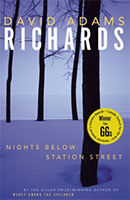 Summary: Adele is a high school student with an older boyfriend named Ralphie, an alcoholic father named Joe and a mother named Rita that she despises. As bitter as Adele is and as much as she wants to be rid of them at times, all of their lives are intertwined with each other. Being a family and living in their community isn’t easy, but when things are at their toughest, Adele’s family proves again and again that they have the strength to band together and face whatever arises.
Summary: Adele is a high school student with an older boyfriend named Ralphie, an alcoholic father named Joe and a mother named Rita that she despises. As bitter as Adele is and as much as she wants to be rid of them at times, all of their lives are intertwined with each other. Being a family and living in their community isn’t easy, but when things are at their toughest, Adele’s family proves again and again that they have the strength to band together and face whatever arises.
Number of Pages: 218
Age Range: 17-18
Review: At first, I didn’t like Nights Below Station Street by David Adams Richards because it made me uncomfortable and I couldn’t get into it. I was plunged into a chaotic household where there was so much anger and resentment that it was disorienting. But I fell in love with Adele, Joe, Rita and Ralphie – Richards made me care about them and brought them to life through his writing.
And I began to see the pain beneath their actions. Joe with his willingness to trust others without reserve and his crippling insecurity that leads him to drink. Adele with her fits of anger that hide the vulnerability she feels as a result of how much she really cares for and loves her family. Rita, who seems to have settled for Joe but still loves him, though she hasn’t always been faithful. And Ralphie, who can’t believe Adele would be with him in some ways, but also knows that they fit together.
I wasn’t expecting to end up loving the book and the characters, but I did. It’s a non-linear story that jumps from character to character without apparent rhyme or reason. Richards writes about a very dysfunctional group of people in Nights Below Station Street, and he doesn’t provide any easy answers, but the portrait he paints is heart-rending with its emotional honesty and the ending is a surprise to all.
This book is for older teen readers and adults, and probably best suited for a Canadian literature course because of its outstanding quality.
Memorable Quotes:
“Everyone wants to change the world; but no one will change themselves.” – quote from Leo Tolstoy from Nights Below Station Street by David Adams Richards
“Although Ralphie already believed that everything in the world, everyone and everything, happened exactly the way that it was supposed to, and that once something did happen, no matter how preposterous it was at first, it was meant to happen and was therefore absolutely natural, he still felt that Adele and he only became boyfriend and girlfriend because no one else seemed to think very much of them. Neither of them knew very much about how to act with these other more special and gifted people – gifted in the way people who assume they are doing all the right things – that is, socially gifted. So he and Adele ended up together.” from Nights Below Station Street by David Adams Richards, page 46
“However, because Adele had been born poor all of her life she had seen more of life by the age of sixteen than a lot of these people – or at least a lot of life some people coming from university had taken courses on and pretended to be dismayed about. It was becoming a cultural thing to be dismayed at the right times about the right things. Adele had seen and heard more of all the thing that were becoming sanctioned as the concerns of the day, but she always measured herself against these people, and always found herself lacking.” – from Nights Below Station Street by David Adams Richards, page 48
“At her young age, she did not understand that criticism of your own in Canada was often considered fashionable expertise. It was her and Joe’s favourite game – one which she still watched every Saturday night – she could never understand the criticisms that were levelled against it. Adele told Ralphie that she had to stay in the bathroom throwing up during much of the games, and when the Canadians lost a game she would got about the house like a ghost refusing to eat, and prayed, her lips moving slowly: ‘Oh God – let Pete Mahovlich get a goal.'” – Adele from Nights Below Station Street by David Adams Richards, page 79
“Like all teenagers, she believed her parents had tremendous faults. All of these faults were visible to her, yet now that she had told them all about them, she looked upon them in a new light, as being inoffensive, and as if she, in the telling of these stories, had taken on responsibility for some of the very mistakes she bragged about her parents committing.” – from Nights Below Station Street by David Adams Richards, page 143
Nights Below Station Street by David Adams Richards is published by McClelland and Stewart (1988).
(Buy this book: Amazon | Indigo
| Canadian Booksellers)




 Amy Mathers has been passionate about reading from a very young age, and hopes others will share her enthusiasm for funding a teen book award.
Amy Mathers has been passionate about reading from a very young age, and hopes others will share her enthusiasm for funding a teen book award. 





